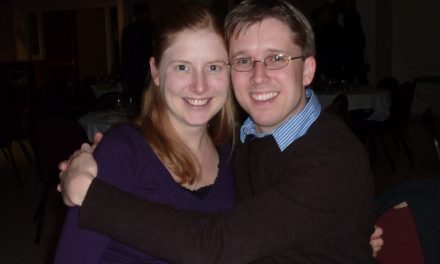1 Kings 19:4-8
Psalm 34
Ephesians 4:30-5:2
John 6:41-51
My wife and I recently finished watching the first season of “Smash,” a television drama about the production of a Broadway musical about Marilyn Monroe. (My wife loves musical and has a degree in theater.) In the season finale, Karen – the would-be heroine of the story who has been passed over repeatedly for the lead role – finally gets her chance to go on stage as Marylin, and she cranks out a heart-wrenching ballad at the very end of the show, bringing down the house. As we sat taking in the emotion of it all my wife turned to me and said, “Words alone aren’t enough for some human experiences.”
In the liturgy we are drawn into the divine drama and mystery via two predominant modes – Word and Sacrament. Even as Scripture is foundation for the Christian life – and the heart and sole of the moral life in particular – Catholic tradition recognizes that Words alone aren’t enough. This is true both in the way we are formed and in the way we act.
I am struck by the way the readings for this week engage all of the senses. Struggling through the desert, Elijah is provided water and a hearth cake, not once but twice, by an angel of the Lord. You can almost feel the dry sand, the sense of despair at his rebuke by Israel, his readiness for death, and then the sense of revival that comes from rest and nourishment as he prepares to make his way to Mount Horeb – Elijah’s own mini-Exodus!
Then the psalmist reminds us not just to think about God, but to “taste and see” the goodness of God that brings joy to those who worship. Similarly, Paul suggests that our practice of the virtues of kindness, compassion, forgiveness, and love (and our rejection of bitterness, fury, anger, shouting, reviling, and malice) is like a sacrifice presenting “a fragrant” aroma to God. Much like genuine prayers rise like incense to God (Ps 141:2), genuine acts of love become an active prayer in our minds (our intentions) and our bodies (our acts).
Finally, in this section of Jesus’ bread of life discourse in John, Jesus presents himself as the bread of life – our source of food for the journey. These are powerful words and images that convey the sense of God meeting our physical and spiritual needs through the fulness of our senses and embodied existence.
Liturgy – Word and Sacrament – engage the entirety of our being, directing our minds and our hearts to the goodness of God in Christ, forming our minds, bodies, and senses into habits that guide our intentions toward acts of love, so that we may “go forth to love and serve the Lord.”
Words alone aren’t enough for some human experiences. Sometimes we have to live out the great love and forgiveness that we receive through our bodies. As St. Frances put it, “Preach the Gospel always. When necessary use words.” The obvious implication affirms the old adage that actions speak louder than words. Forming our minds, hearts, and intentions, the Liturgy moves us one step closer to acts of kindness, compassion and love. These acts of love are the greatest witness we can provide like a fragrant offering to God and to the world.


